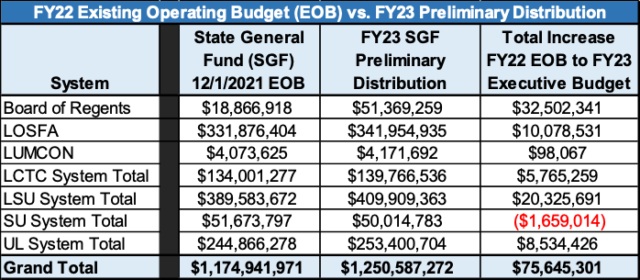BATON ROUGE, La. – A new college mathematics and English placement policy adopted by the Louisiana Board of Regents effectively eliminates remedial coursework in the state’s public universities and colleges, replacing it with a proven nationally recognized reform model. The revised policy is the result of two years of collaborative work between Regents staff, faculty, campus stakeholders, system leaders, and national experts to improve student success through the statewide adoption of a co-requisite math/English framework.
Under the new guidelines, college students needing remediation will be placed in for-credit or gateway math/English courses while given additional academic support, an approach known as co-requisite. This will result in students taking a for-credit math or English course with longer time on task instead of a shorter, not-for-credit remedial course.
The new approach is designed to:
-
- Increase the number of students who can access and successfully complete gateway courses;
- Increase retention and graduation rates of college students; and
- Remove access and outcome barriers for Louisiana students.
“Today’s action by the Board is a great example of putting our Master Plan objectives into play,” said Board of Regents Chair Collis Temple III. “Addressing barriers to student success, like passing college-level math, gets us closer to our goal of doubling the number of credentials in our state by 2030 and at the same time saves our students time and money.”
In 2020, Louisiana was one of seven states to receive a $300,000 Education Commission of the States (ECS) Strong Start to Finish grant supporting the state’s Math Forward Initiative, designed to scale the co-requisite education model. In its preliminary analysis of data from Academic Year 2020-21, Regents found freshmen participating in co-req math achieved a passage rate of 55%, compared to 11% for those taking remedial math alone. These results mirror similar work in other states, including Tennessee and Georgia.
The approved Gateway Mathematics and English Course Placement Policy is effective statewide for mathematics courses in the fall 2023 and for English courses in the fall 2024 semester.
Complementing the placement policy, Regents also approved Prior Learning Assessment (PLA) guidelines allowing undergraduate credit to be awarded to students for learning that has occurred outside of college, in settings such as the workforce or military. PLA is a national best practice that supports students seeking to return to college to earn a degree after having gained skills or work experience without receiving a credential. To ensure a fair and transparent process for students, in every case where PLA credit is awarded, institutions must match the learning outcomes identified with an equivalent course found in a standard articulation table, such as the Louisiana Common Course Catalog.
“For Louisiana to reach its attainment goal of 60% of working adults with a degree or credential by 2030, we have to focus our efforts on both traditional students coming to college right out of high school as well as transfer students, near-completers, adult learners and veterans, who all bring a variety of experience with them when they arrive on campus,” said Commissioner of Higher Education Kim Hunter Reed. “By honoring all the pathways that lead students to us, we can ensure more Louisiana citizens get the education and training necessary to prosper in our knowledge economy.”
Under the new guidelines, credit is awarded based on national standards such as Advanced Placement (AP), the College-Level Examination Program (CLEP), Industry-Based Certificates (IBC), DANTES Subject Standardized Tests (DSST), or military exams or training. Credit may also be awarded based on the evaluation of a portfolio of professional experience or through a faculty-developed institutional challenge exam.
“Complete College America (CCA) commends the Louisiana Board of Regents for their commitment to college completion by adopting policies that promote co-requisite support and prior learning assessments,” said Dr. Yolanda Watson Spiva, president of Complete College America. “CCA is a champion of this work. We are confident that these strategies will be employed at scale across Louisiana, and with success, because CCA Fellow Dr. Tristan Denley was instrumental in full-scale implementation of corequisite support in Georgia and Tennessee, increasing pass rates and eliminating equity gaps.”
In other action, Regents adopted a new formula distribution that increases funding for improved student outcomes, bringing outcomes-based funding to 28%. This model will be used to allocate funds appropriated by the legislature through its budget process.
The Governor’s Executive Budget proposes an increase of more than $100 million for higher education, with $15 million of those dollars to be used to drive stronger student outcomes as campuses focus on increasing Louisiana’s education attainment rate to 60% by 2030.
The approved preliminary FY 2022-23 funding allocation will be submitted to the Senate Committee on Education, the Senate Committee on Finance, the House Committee on Education, and the House Committee on Appropriations no later than March 31, as required by law.

Additional proposed funding to be allocated includes $31M for faculty pay increases. In the event funding levels change as the appropriations bill moves through the process, a new allocation will be submitted to the legislature for the latest version of the appropriations bill.
